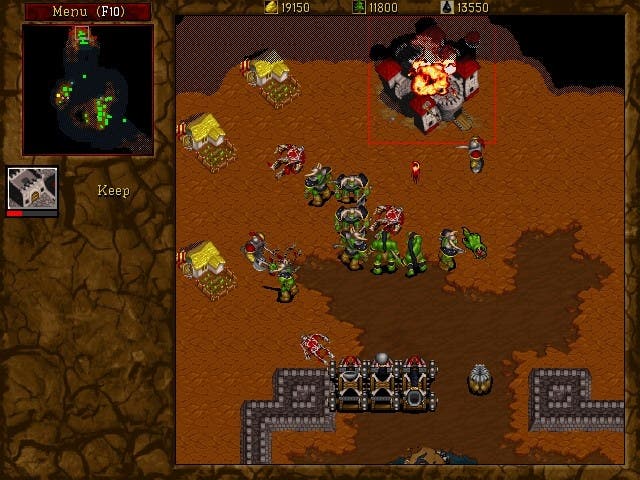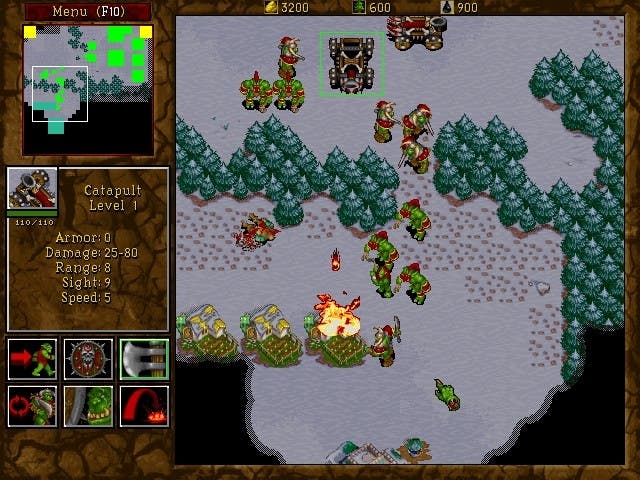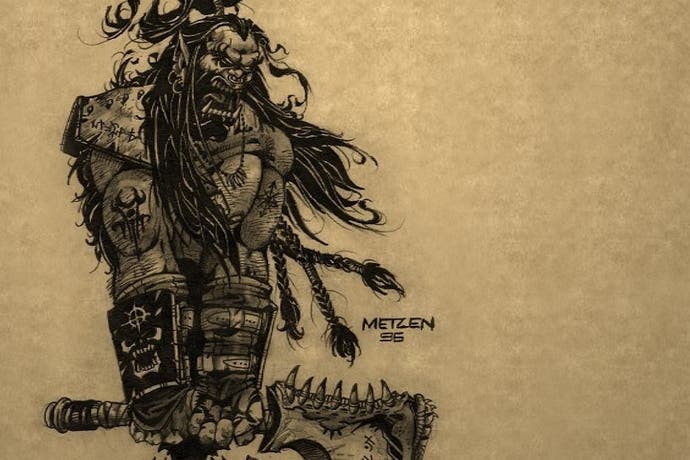Warcraft 2 was terrific, influential - and absolutely ridiculous
Historical conflict.
Most of my memories of Warcraft 2 fall somewhere on a spectrum between the fond and the ridiculous, very often featuring elements of both. It was the first game that gave me the opportunity to win a protracted battle of minds with another person; my first multiplayer victory in something that wasn't a five minute action or sports game, set up on a rudimentary home network typical of the mid 90s. We only had one CD, but that was fine. Warcraft 2 allowed you to share your copy for the purpose of multiplayer. Blizzard were a permissive bunch.
It was the first game that I remember introducing ridiculous barks, those acknowledgements whenever you selected a unit or issued an order. A whole generation of PC gamers still has many of those memorised and we all knew that persistent clicking made our armies angrier and angrier. Two headed ogres began to argue. "Are you still touching me?" exclaimed frustrated soldiers. "You're making me seasick," insisted ships' captains, before the sound of relatively high-fidelity vomiting came through your speakers. The thing that you need to understand is that this never got old. To this day, "Your sound card works perfectly!" remains a phrase as popular as it is plainly declarative.
Similar repetitive clicking also made the game's sheep explode. I still don't know why these neutral units were walking about the map or what purpose they served, so perhaps they really did only exist to blow up for the amusement of puerile teenagers like myself. That was fine, we thought it was great.

We thought it was great because Warcraft 2 was the ideal game for us, for teenagers who needed that perfect mix of the stimulating and the silly. Real-time strategy games were still in their infancy and the mixture of resource-gathering and army management was a new, exciting and constantly stimulating way to play and to fight a war. It felt like you were perpetually spinning plates as you panned your camera across the battlefield, switching between combat and non-combat units, issuing new build orders, making sure your base was protected and sending armies out to further push back the fog of war, that thick black veil, that was draped across all the RTS games of the era. You were both an economist and a strategist. Fail in one role and you could not succeed in the other.
At the same time, and even in those days, we recognised the ridiculous. There was the drunken pathfinding that had your units bumping off one another like weebles in an alleyway, inevitably leading to at least one archer deciding to take the long way round and then being ambushed by the enemy, even blihtely strolling right though their headquarters. There was the dogged determinism of your worker units, who bravely tried to push past the enemy to collect gold or lumber instead of fleeing for their lives. Daftest of all were the inevitable soldier-versus-building showdowns, where the only way to destroy enemy structures was to have your forces slash them with swords or pepper them with arrows until, eventually, they caught fire and exploded. Don't for a second think that the gamers of the past were a blindly forgiving bunch. Even then, we recognised that stabbing a castle looked stupid.
Things like these were establishing themselves as RTS standards and in the years ahead we'd cheer whenever we saw a game that found some way to flout them, but for the time being we could just about handle the dumb units and the strange happenings, because the pace of the game was more than enough distraction. You desperately need more units, yet before that you desperately need more farms to feed them, yet before that you desperately need more lumber, gold or even oil in the bank. The best way to get more of those is, naturally, to build more worker units, yet those again demand more farms... This economic cycle wasn't just the engine that powered your conquests, it could also be a source of serious vulnerabilities. Lose a farm or two to a raid and you might lose the ability to expand your forces. Those farms have to be rebuilt, which takes money and time, during which your battle plans might have to be put on hold. Hitting people where it hurt almost always involved a swift kick to the wallet.

That first victory I mention was an economic one rather than a tactical one, as much due to a lack of diligence than my ever-growing ranks of well-fed archers. I defeated my rival because he failed to keep track of how much money was left in the mine he'd been forever plundering, so busy he was sending so many peasants into it that he'd effectively created a human pipeline. When it coughed up its last gold coin and crumbled into nothing, he suddenly realised he had no way to repair his damaged village, nor any way to bring fresh orcs into the fight. Everything began to collapse while, across the other side of the map, I slowly and diligently assembled another strike force.
It wasn't quite a foregone conclusion, mind. Warcraft 2 did a fine job of giving each of its units a distinct ability or advantage of some sort, making combined tactics important, and at range my infantry would have been crushed by an assemblage of substantially upgraded catapults. Up close, however, those things were useless, expensive boondoggles that, like just about anything else in the game, could be furiously stabbed until they erupted in flames.
It's astonishing to me now that Warcraft 2 is almost 20 years old, because I still remember the conclusion to that particular game very clearly. I remember winning and I remember the exact moment of winning, something I knew could only have happened if I'd kept all those plates spinning fast enough and for long enough. Replaying the game today, it's unfair to expect it to have aged well and, naturally, it now feels clumsy. Still, there's a particular sort of familiarity there and it clearly, proudly wears many of the stylistic and mechanical elements that its descendants would inherit. While the execution was refined for Warcraft 3, many of the mechanics remained the same. Those exploding sheep resurfaced in World of Warcraft. The bickering, two-headed orge still lives on as a hero in Dota 2.
It's not often that we can trace a lineage so distinct, but its perhaps even more remarkable that it reaches so far. I'm now twice as old as I was when I won that game, and Blizzard own several franchises that are beginning to stretch across generations. The difference now is that, at this moment, there are more players than ever experiencing their first victory, whether that's in Starcraft 2, Hearthstone or Diablo 3. They're more elegant victories, I'm sure, in shinier arenas and with smoother, wiser and more intelligent execution. They might never know of a time where we used to stab castles, but I'm quite sure they're making their own memories, both fond and ridiculous.









